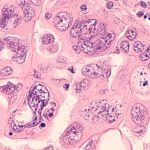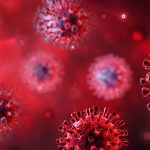 Daniel Johnson, Ph.D., has received a $1.9 million, five-year grant from the National Institutes of Health to continue work into understanding how gene mutations affect oral squamous cell carcinoma (OSCC), determining the risk to patients from various therapies and developing new treatments.
Daniel Johnson, Ph.D., has received a $1.9 million, five-year grant from the National Institutes of Health to continue work into understanding how gene mutations affect oral squamous cell carcinoma (OSCC), determining the risk to patients from various therapies and developing new treatments.
Approximately 40,000 cases of the deadly cancer OSCC are diagnosed each year in the United States, and they are strongly associated with tobacco and alcohol consumption or infection with human papilloma virus. Surgery, chemotherapy and radiation are the mainstays of treatment for advanced OSCC, but these therapies frequently result in disfigurement and adverse reactions. Patients whose cancer recurs often develop resistance to existing chemotherapy and radiation therapy.
“Efforts to combat OSCC have been severely hindered by an incomplete understanding of the mechanisms of disease progression and a lack of molecular markers that can be used to predict responsiveness to chemotherapy and radiation,” said Dr. Johnson, professor of medicine at Pitt and a senior scientist in the University of Pittsburgh Cancer Institute Head and Neck Cancer Program
Dr. Johnson’s team will focus on a gene called procaspase-8, which is commonly mutated in OSCC. The researchers will use cell line and preclinical tumor models, as well as tumor specimens from OSCC patients, to determine the role of procaspase-8 mutations in chemotherapy and radiation resistance. They will also use molecular targeting of two cellular kinases – ATR and ATM – involved in repair of DNA damage in an effort to reverse chemotherapy and radiation resistance in OSCC cells and tumors harboring procaspase-8 mutations.
“We expect that our findings from this work will lay the foundation for biomarker-driven clinical trials evaluating the value of ATR or ATM inhibition in patients with procaspase-8 mutations,” Dr. Johnson said.








